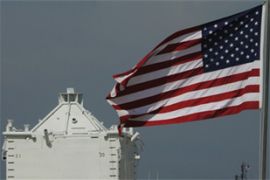BP in new bid to contain oil spill
Engineers lowering another dome on top of the massive undersea leak in the Gulf of Mexico.

Second well
The new box is smaller, so less cold water can accumulate inside and freeze. It also has a system that allows engineers to pump in methanol, a chemical which can be used as an antifreeze.
| in depth | |
|
If the second box fails, BP officials say they will try shooting debris – like golf balls and shredded tires – into the rig’s pipes, in the hope of clogging the well.
BP is also drilling a second well to divert flow from the Deepwater Horizon rig.
But the company says it will take months to drill down 5.5km into the oil reserves; a spokesman said that the relief well has currently been drilled to about 3,000 metres.
The oil spill started on April 20 after the rig exploded.
More than 5,000 barrels of oil per day are believed to be pouring into the Gulf of Mexico, threatening wildlife in the water and along coastal beaches and wetlands.
Experts say the spill could be one of the worst environmental disasters in decades.
Congressional grilling
Meanwhile, executives from BP and two other firms were questioned for a second day by a US senate committee investigating the oil spill.
The back-to-back hearings, which began on Tuesday, were the first congressional inquiry into the April 20 incident.
The panel said it had uncovered significant problems with a safety control mechanism on BP’s oil well that could have contributed to the accident.
|
On Tuesday, BP and other oil industry executives traded blame in congress |
Senior executives from BP, Transocean and Halliburton were asked to account for the “cascade of failures” at the Deepwater Horizon drilling platform.
BP was the exploratory well’s owner and overall operator, Transocean the rig’s owner and Halliburton a subcontractor that was encasing the well pipe in cement before plugging it in anticipation of future production.
The three companies’ executives took turns blaming each other when asked about lax safety and unpreparedness.
Each company defended its own operations and raised questions about its partners in the project.
The corporate finger-pointing prompted an admonishment from Lisa Murkowski, the Republican senator of oil-rich Alaska, who said “there will be no excuse” if operators are found to have violated the law.
“This accident has reminded us of a cold reality, that the production of energy will never be without risk or environmental consequence,” she said.
